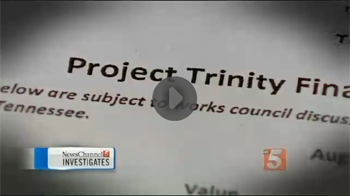Exemptions generous when it comes to economic development records
A few months ago, we reported here in a post about public records that the governor’s office had denied state Rep. Mike Turner, D-Nashville, access to economic development records, citing two laws as the basis for protecting the information from public disclosure.
Last night, those documents, leaked to NewsChannel 5’s Phil Williams, became the basis of a story about the Haslam administration’s effort to tie incentives to the outcome of work council discussions with Volkswagen over its plant in Chattanooga.

The Department of Economic and Community Development makes a point to tell Williams that “the offer did not preclude the creation of a works council or union representation as a condition of the incentives.” But Turner told NewsChannel 5 it appeared the state was pressuring VW on the issue — an issue that eventually led to a controversial union vote at the plant.
“Looks like to me they put a gun to their head and said, ‘Look, this is what we are going to give you if you do it our way and we are going to jerk it away if you don’t,’ ” Turner told Williams.
ECD is given broad latitude in the law to keep documents related to its development efforts confidential, with the idea that without this confidentiality, the state would not be able to successfully compete with other states to bring new jobs to Tennessee. Following is the main exemption under T.C.A. 4-3-730 often cited for confidentiality:
(b) Any binding contract or agreement entered into or signed by the department that obligates public funds shall, together with all supporting records and documentation, be considered a public record and open for public inspection as of the date such contract or agreement is entered into or signed.
(c) (1) Notwithstanding any other provision of law to the contrary, any record, documentary materials, or other information, including proprietary information, received, produced or maintained by the department shall be considered public unless the commissioner, with the affirmative agreement of the attorney general and reporter, determines that a document or information is of such a sensitive nature that its disclosure or release would seriously harm the ability of this state to compete or conclude agreements or contracts for economic or community development
ECD allows the public to view economic development agreements with companies after, and if, the deal is signed. Presumably if VW had signed the $300 million offer, the public would have eventual access to the details. Perhaps citizens would have access to earlier offers the state made to a company if a later, modified offer was accepted.
Tax credits for economic development
But some details related to economic development incentives are never revealed. Those involve the actual amount of money companies eventually receive in tax credits in exchange for creating jobs. Tax credits are one of the types of incentives promoted by ECD — other incentives can be cash grants or infrastructure improvement, for example.
The state cites another exemption for protection of tax credit information tied to economic incentives, this one related to taxpayer confidentiality and handled by the state Department of Revenue. Here is that law, 67-1-1702(a):
(a) Notwithstanding any law to the contrary, returns, tax information and tax administration information shall be confidential and, except as authorized by this part, no officer or employee of the department or of any office of a district attorney general or any state or local law enforcement agency, and no other person, or officer or employee of the state, who has or had access to such information shall disclose any such information obtained by such officer or employee in any manner in connection with such officer’s or employee’s service as an officer or employee, or obtained pursuant to this part, or obtained otherwise.
Advocacy organizations, such as Good Jobs First, have criticized lack of transparency in state economic development programs across the country, saying allowing citizens more information would bring more accountability to the programs.
There have been some efforts in Tennessee to disclose more information to citizens. The state in recent years started posting some information on an OpenECD website. There you can see a list, for example, of FastTrack awards, updated quarterly.
Proposed legislation this session by state Sen. Lowe Finney, D-Jackson, and state Rep. Craig Fitzhugh, D-Ripley, would require more reporting regarding whether FastTrack recipients are meeting conditions of the grants, such as the number of jobs they promised to create. The bill has received support in the Senate State and Local Government committee and the House State Government Committee and is now waiting action in the finance, ways and means committee and subcommittee in the Senate and House respectively.
Written by Deborah Fisher, executive director of the Tennessee Coalition for Open Government, an alliance of citizen, media and civic groups working to preserve and improve transparency in government through education and research. She can be reached at [email protected].




